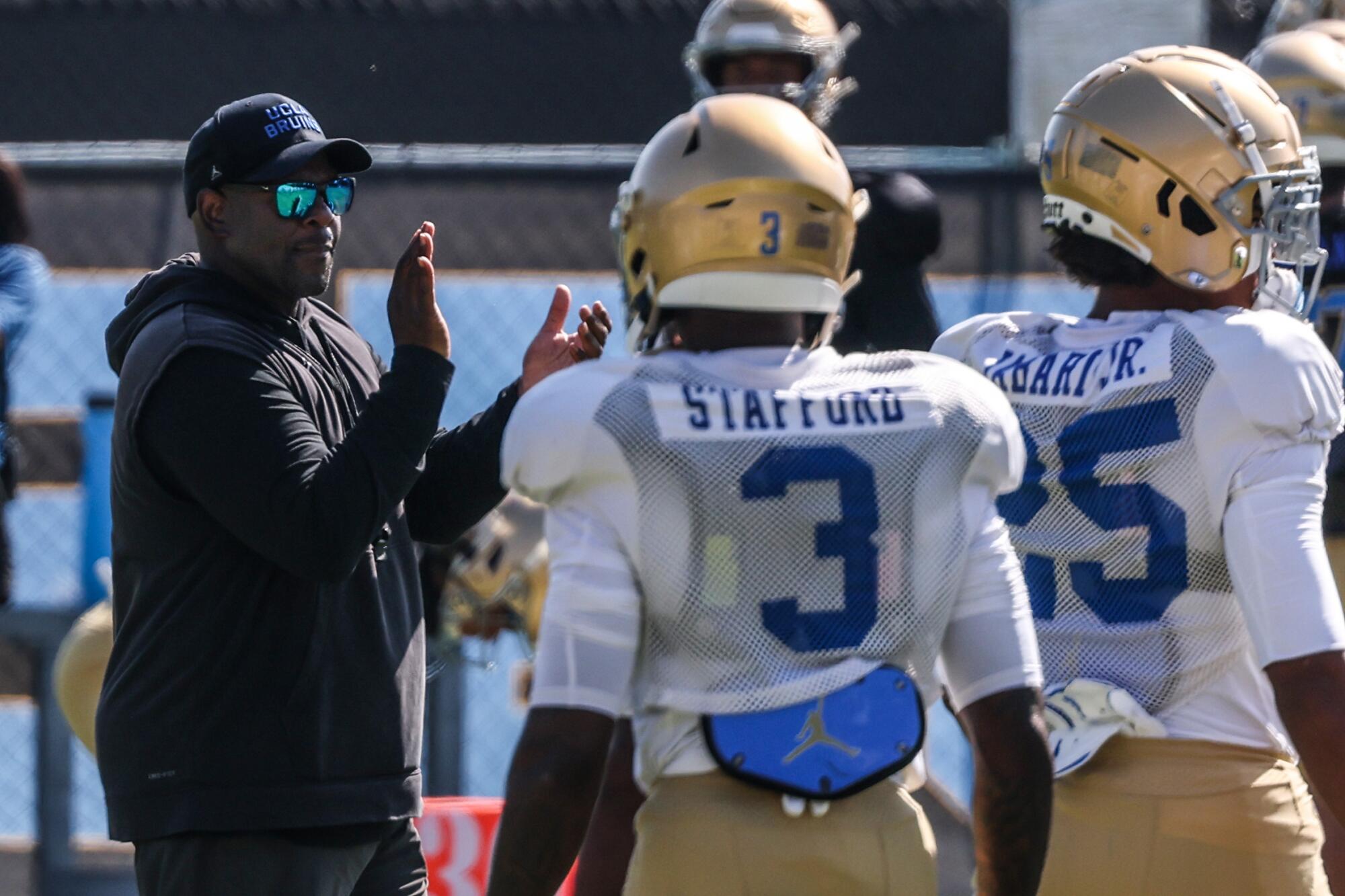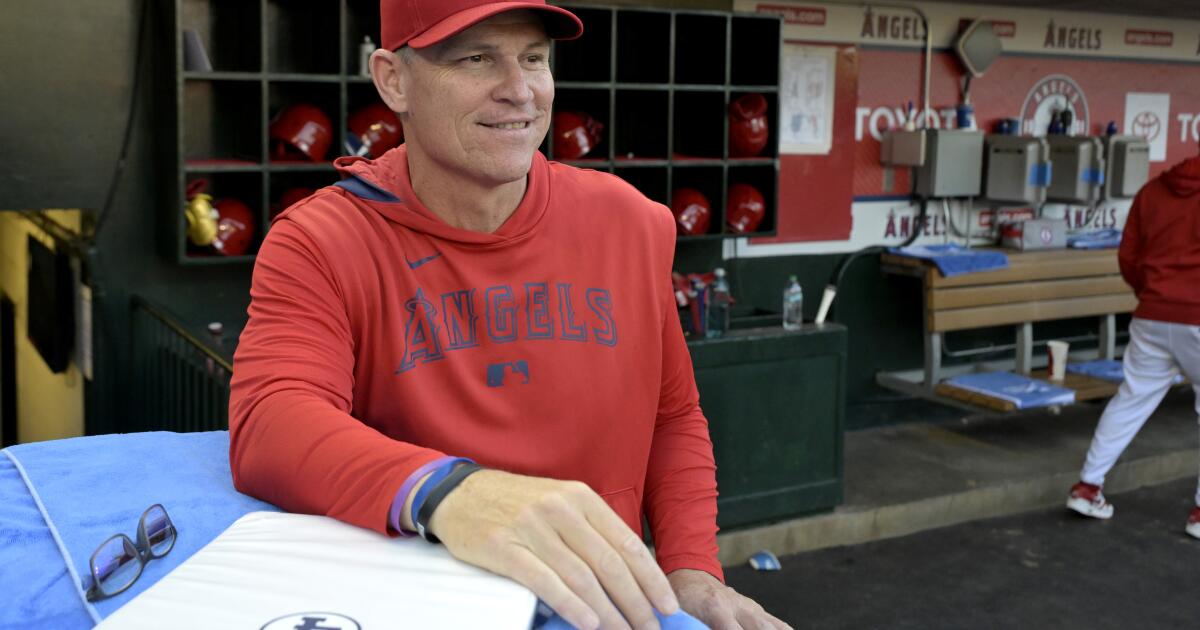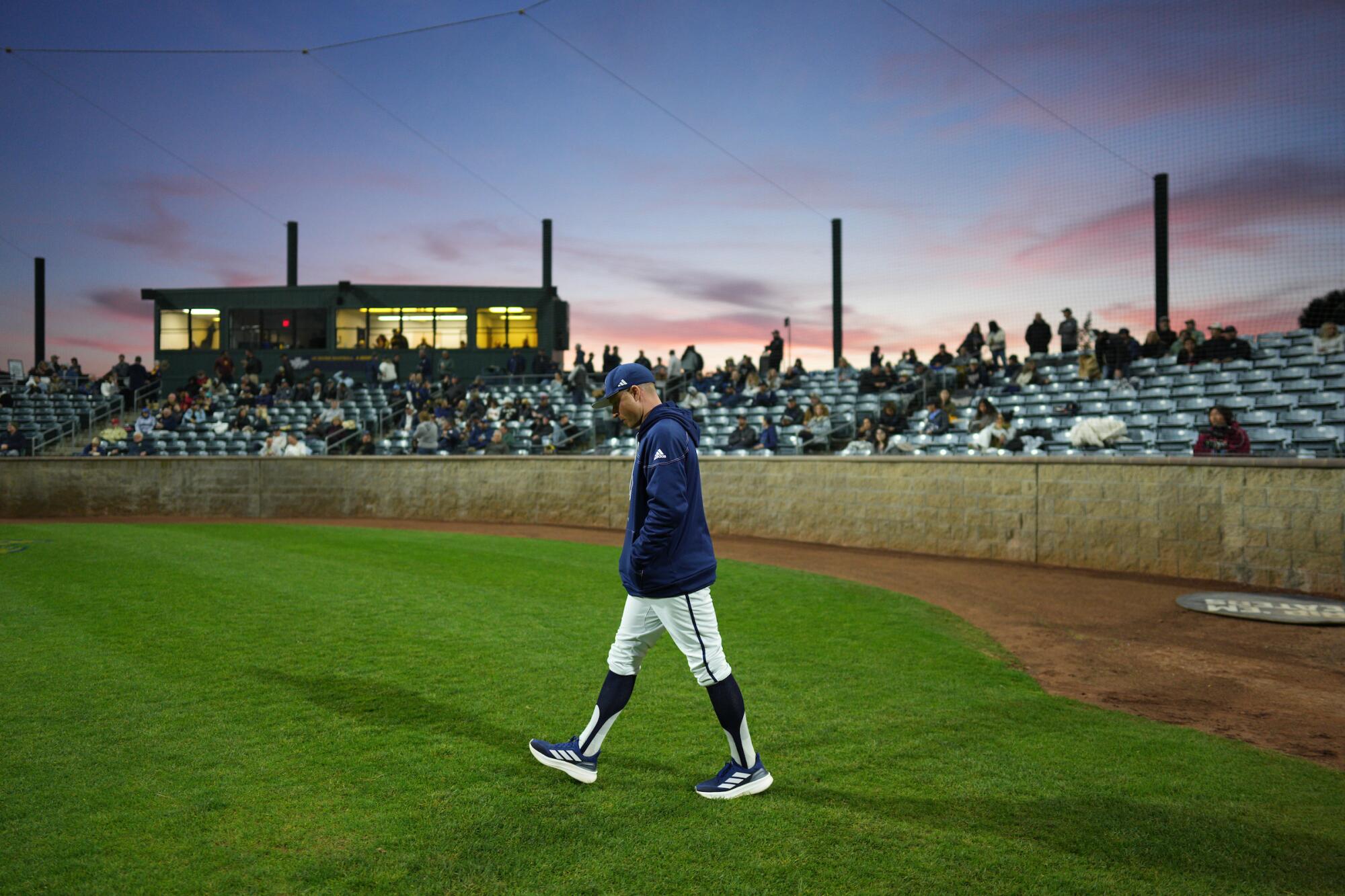UCLA loses defensive coordinator Ikaika Malloe after 0-3 start
The fallout from UCLA coach DeShaun Foster’s dismissal deepened Wednesday when interim coach Tim Skipper disclosed that defensive coordinator Ikaika Malloe had agreed to “mutually part ways” with the team, depriving the Bruins of one of their most respected assistant coaches.
Meeting with reporters for the first time since he was selected to coach the team for the rest of the season, Skipper said he didn’t know the specifics of Malloe’s departure. One person close to the coaching staff, who spoke on condition of anonymity because of the sensitive nature of the subject, told The Times that Malloe couldn’t get past blaming himself for the team’s 0-3 start, even suggesting that he be fired instead of Foster, so it was agreed that it would be best if he took time to regroup and focus on himself.
UCLA interim head football coach Tim Skipper claps as players participate in practice at Drake Stadium on Wednesday.
(Robert Gauthier/Los Angeles Times)
It’s believed that Skipper will be given the resources needed to bolster his coaching staff if he wanted to bring in another assistant. In the meantime, Skipper said the team would take a collaborative approach among remaining staff to coaching the defense.
Malloe was a favorite of players and was known for demanding as much from himself as anyone on the team, choking up early last season when he discussed the need to fix the Bruins’ defense. After Malloe made two personnel switches, moving Oluwafami Oladejo from linebacker to edge rusher while elevating linebacker Carson Schwesinger into the starting lineup, UCLA’s defense went on to be a team strength.
Even though UCLA’s defense struggled in the early going this season, giving up 36 points and 431 yards per game, Malloe remained universally adored by players.
“I know some of the defensive guys loved him so much, and sorry to see him go,” offensive tackle Garrett DiGiorgio said. “Initial reaction as a man, he’s a great person, great family person, and he brought so much value to this team. It’s just unfortunate that I feel like he felt somewhat responsible, along with Foster as well. All we can do is support him on his next step, and hopefully he can come back and see the guys at some point.”
There were no immediate roster defections, Skipper saying that every player was accounted for going into one of the team’s longest practices of the season. Players will have 30 days to enter the transfer portal after their coach bid them farewell during an emotional meeting Sunday morning.
DiGiorgio said Foster told the players who were able to attend the hastily arranged meeting early in the team’s bye week to keep their heads up and keep pushing. Making things all the more difficult was the culpability that some players beared for the team’s fortunes.
“I felt somewhat accountable as a player and as a captain,” DiGiorgio said, “of letting him down as head coach.”
UCLA interim head football coach Tim Skipper talks with media before practice at Drake Stadium on Wednesday.
(Robert Gauthier/Los Angeles Times)
Skipper acknowledged the strain of replacing a close friend who had visited his parents’ house and eaten his mother’s cooking, saying he considered Foster part of his family.
“It definitely wasn’t just great feelings and things like that,” Skipper said of the situation, “but we both know we’ve got to move on.”
This is the second time in as many seasons that Skipper will serve as an interim coach after taking over for Jeff Tedford in July 2024 and guiding Fresno State to a 6-7 record that included an appearance in the Famous Idaho Potato Bowl.
Having served in an inconspicuous role since his arrival as special assistant to the head coach in the middle of July, Skipper spent part of the last few days introducing himself to players and letting them know about his history as a former middle linebacker at Fresno State who has made coaching stops at eight schools.
First impressions have been positive.
“His initial energy and just the way he is in meetings,” DiGiorgio said, “I think he’s trying to uplift us as athletes and he’s not really trying to focus too much on what happened but more on the future and what we can do.”
Skipper was upbeat in his first public remarks since taking over for Foster, shaking every reporter’s hand before encouraging them to call him “Skip,” his preferred nickname. He said he would treat this bye week as a sort of mini-training camp before shifting into game preparation mode for the Bruins’ Big Ten Conference opener against Northwestern on Sept. 27.
“We are completely resetting,” Skipper said. “We’re not going to dwell on the past, we’re not going to dream about the future. We’re going to worry about right now.”
How do the Bruins go from the Big Ten’s only winless team to one that can start having success?
“We need to change our style of play, as far as how hard and how fast and how physical we play, OK?” Skipper said. “Starting with me and the rest of the staff, we have to make sure we simplify things so guys can play full speed ahead and there’s less thinking. That’s kind of my whole motto.”
Rediscovering the joy in football is part of that new approach. DiGiorgio said players are starting to play music in the locker room again, the offensive lineman bringing in his own portable sound system for everyone to enjoy.
“We’ve got to be able to come out here and not treat practice as practice,” DiGiorgio said, “but more as something that we get to do and we have the ability to be on this team.”
DiGiorgio said players would also meet with athletic director Martin Jarmond every Sunday to talk about how things are going with the team and try to build momentum for the rest of the season. Jarmond received public support for the coaching change Wednesday in a statement from Chancellor Julio Frenk provided to The Times.
“At a top university like UCLA, a successful football program plays a powerful role in building community and strengthening connections,” Frenk said in the statement. “I support Martin Jarmond’s decision to replace the football coach. As the leader of our athletics program, he will oversee the process of hiring a new head coach who will elevate UCLA football to national prominence and uphold our commitment to ensuring the best experience for our student-athletes.”
As far as the rest of this season goes, Skipper said he wouldn’t measure success by wins and losses but style of play.
“We need to get out there and give a product that everybody’s proud of,” Skipper said, “that’s exactly all I’m worried about.”


